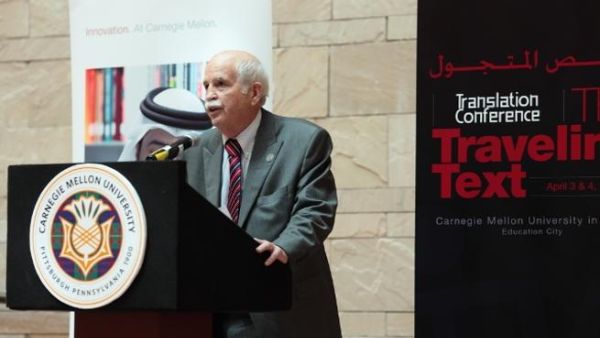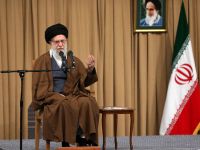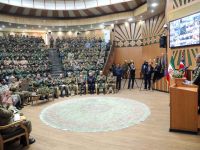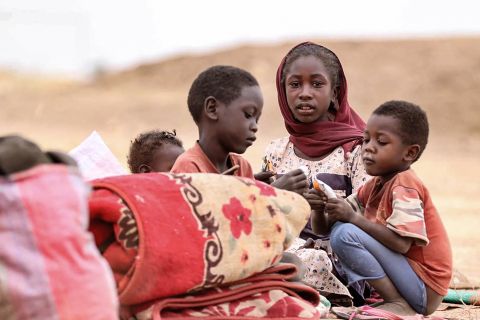Mastering translation techniques and overcoming challenges addressed at conference held at CMU

In association with Carnegie Mellon University in Qatar, Bloomsbury Qatar Foundation Publishing (BQFP) held the second annual two-day translation conference on April 3 and April 4, titled The Traveling Text. Taking place at Carnegie Mellon Qatar’s campus, the conference addressed current and ongoing challenges facing translators, while providing practical solutions from veteran experts and linguists in the field.
“Following the success of last year’s conference, Carnegie Mellon University in Qatar joins forces with Bloomsbury Qatar Foundation Publishing to bring international plenary speakers and workshop leaders to Qatar,” said Amal Mohammed Al Malki, Ph.D., assistant teaching professor of English at Carnegie Mellon University in Qatar, who helped to develop the conference program. “Language is a powerful tool in bringing people together. This year we are exploring translation from and into more languages, giving us insights into new cultures. Our workshops deal with different topics in translation, providing in-depth knowledge and instant training in a friendly and interactive format.”
“Carnegie Mellon Qatar understands the importance of translation in our bilingual and multilingual students’ daily lives and the need to equip them with the academic training that helps to turn a simple daily act into a professional one,” she added.
This conference has been developed in conjunction with BQFP as part of its efforts to improve standards of Arabic language translation, as well as editing of texts both into and out of Arabic and make it more accessible. Mohanalakshmi Rajakumar, PhD, Reading and Writing Development Director of BQFP said: “We have added French, Hindi and Russian as languages of expertise provided by the plenary and workshop leaders this year. We are pleased to continue expanding the conversation about translation, texts and literature as a publisher based in the Arab world. As a publisher of translated works, BQFP supports this conference as an effort to provide opportunities for conversations and collaboration.”
Integrated as part of the two-day conference, experts in the translation field conducted workshops with leading practitioners and educators to focus on various aspects of the craft in relation to translating from Arabic to English and vice versa as well as among other languages. The different workshops were led by Sameh F. Hanna, lecturer in Translation Studies and Arabic at the University of Salford; Samia Mehrez, Director of Center for Translation Studies at American University in Cairo; Dr. Nabila Zouaoui, expert to the Qatari Minister of Culture, Arts and Heritage, Dr. Hamad Al Kuwari and Dr. Afnan Fatani, associate professor of linguistics in the department of European Languages and Literature at King Abdul Aziz University in Saudi Arabia.
The conference plenary sessions were moderated by well-known Egyptian novelist, Ahdaf Souief. “It’s wonderful to be back for the second translation conference, which in my opinion has grown up and expanded to discuss important topics with regards to translation and attract a distinguished array of translators both as plenary speakers and workshop leaders,” said Souief.
The first plenary session, titled “The Way I Work”, was conducting by Arch Tait, translator and editor who received a Ph.D. in Russian literature from Cambridge University and Amanda Hopkinson, Professor of Literary Translation at the University of East Anglia. Arch Tait described the practical methods of translating, starting at draft one to the final document, while elaborating on the most useful techniques a veteran can make use of. To discuss further the importance of mastering translation techniques, a second interactive plenary session titled “Book to Book/Page to Page” was delivered by Daniel Hahn, a writer, editor and translator, and Jason Grunebaum, a writer and translator.
The second day of the conference, which took place on Monday, April 4, included the third workshop session as well as the closing plenary session, moderated by Ahdaf Soueif, titled “Ways Forward: A Public Round Table of Plenary Speakers and Leaders.”
Background Information
Carnegie Mellon University Qatar
For more than a century, Carnegie Mellon University has challenged the curious and passionate to imagine and deliver work that matters. A private, top-ranked and global university, Carnegie Mellon sets its own course with programs that inspire creativity and collaboration.
In 2004, Carnegie Mellon and Qatar Foundation began a partnership to deliver select programs that will contribute to the long-term development of Qatar. Today, Carnegie Mellon Qatar offers undergraduate programs in biological sciences, business administration, computational biology, computer science, and information systems. Nearly 400 students from 38 countries call Carnegie Mellon Qatar home.
Qatar Foundation
Qatar Foundation (QF) is a non-profit organization made up of more than 50 entities working in education, research, and community development.
Our unique ecosystem—supported by partnerships with leading international institutions—is built on initiatives that address our most pressing challenges, create global opportunities, and empower people to shape our present and future.







